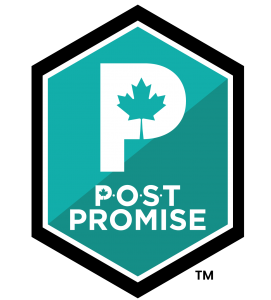By Theresa Rogers
You may never have heard the name Kirsty Duncan before the new Liberal government’s Cabinet was announced last November but she’s been involved in federal politics since 2008.
During her academic career, Duncan was an associate professor of health studies at the University of Toronto and a research director at the former AIC Institute for Corporate Citizenship at the Rotman School of Management. She was a member of the Advisory Board for Pandemic Flu for the Conference Board of Canada and the University of Toronto, and has served on the Intergovernmental Panel on Climate Change.
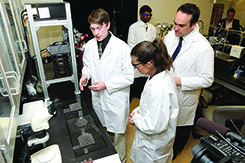
It’s been four months since the federal election and LAB Business has been anxious to speak with the minister and hear how she will tackle her role as Minister of Science. Here’s what she told us.
What are your top priorities as a new Minister of Science?
I am delighted to have been appointed to this position. Science is such a big part of my life and has been for many years. My first few months on the job have been a fantastic whirlwind. I’m enjoying meeting so many inspirational people, and working with my colleagues, both federal and provincial and territorial to really get science back to its rightful place in our government – and in our society.
My top priorities as Minister are to support research and make sure that science is considered in the government’s policy-making and investment choices.
More specifically, what I will be working on in the near term is strengthening support for fundamental research. I’ll also be working with my colleagues to review and reform Canada’s environmental assessment processes, help employers create more co-op placements for STEM students; establish new research chairs in sustainable technologies; and examine the implications of climate change on Arctic marine ecosystems.
You have been tasked with establishing the new position of chief science officer that would serve as a replacement to the position of national science adviser role eliminated by Stephen Harper in 2008. Have you begun that process? When can we expect an announcement and what will this role look like?
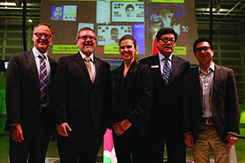
Yes, as was outlined in my mandate letter, I’m working with officials to create a Chief Science Officer position – a person whose job it will be to ensure federal science is accessible and communicated. We have begun the process of looking at best practices and the most appropriate means for getting a Chief Science Officer position set up. There is a lot to consider, and it is premature to get into details at this point, but what I can say is that I will be reaching out to key stakeholders in the broader scientific community to discuss how to establish the position. We are taking the time necessary to make sure we put into place the right mechanisms to make this work and ensure that government science is fully available to the public.
During the election, your party was vocal about changing the “muzzling of scientists” that we’ve come to know recently. How will you do this?
Our government is committed to treating scientists with respect, and I can’t emphasize this enough. That is why one of our first actions after forming government was to announce to the world that Canadian federal scientists were from that day on free to discuss their work with the media and with the public. And we underscored our commitment to ensure that scientific analyses are considered in government decisions.
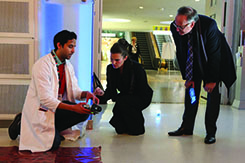
I should point out that the day before that we reinstated the long form census. We did this because the benefits of good quality scientific data – for researchers, for policy-makers, for communities – cannot be overstated. Freedom of information is a fundamental pillar of a well-functioning democracy.
How will you work with Minister Bains? How do your roles integrate?
The fact that both Minister Bains and I have ‘science’ in our official title reflects the importance the government places on the role of science in informing our policies and driving innovation and growth throughout the Canadian economy.
With this in mind, Minister Bains is responsible for working to enhance government support for innovation, scientific research, and entrepreneurship. As Minister of Science, I am responsible for supporting scientific research and the integration of scientific considerations in our investment and policy decisions across government. We are both focused on working together to ensure that the Government of Canada’s policies are based on science, facts and evidence.
You are a trained geographer, though you have much related science experience – as Health Critic, in climate change and with flu pandemics. How important is experience in a role such as this?
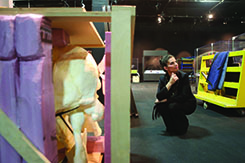
Experience is certainly important, and as for mine, it speaks for itself. I have been committed to science for the past 25 years. As a former scientist and a former teacher, I have spent much of my career at the intersection between science and policy. Evidence-based policy-making matters profoundly to me.
I began teaching at university early in my career. Shortly thereafter, recognizing the need for more government action on scientific issues in which I believe, I started consulting to government. Around the same time, I began putting together an expedition to discover the cause of the 1918 influenza, a pandemic that killed upwards of 50 million people. Our team headed to an island north of Norway to exhume the bodies of individuals who died of the flu and were buried in the permafrost. Our goal was to learn as much as we could about the virus, so that we could test our drugs against history’s deadliest disease and perhaps make a better flu vaccine. So I am very familiar with both the world of research and the world of policy, and this job requires a lot of both.
It also requires the ability to bring people together. Science is such a huge domain with many diverse areas of investigation, and connecting them can bring about unforeseen new ideas. This is one of our great assets in Canada and bringing them together to create new ideas and generate new knowledge is something that the government can play a role in. This is key to supporting innovation. And that’s exactly what I plan to do.
What do you see as Canadian scientists’ top concerns and how will you address them?
I have met a lot of scientists from many backgrounds and who are committed to many diverse fields of study, and I honestly believe that for the most part, their overarching concern with respect to government and the public is that they want to be able to communicate freely about their work, they want to be heard, they want science to be restored to its rightful place and for science to be strongly supported. Scientists want to have their work recognized, considered, and yes, even challenged when it is necessary to do so. The vast majority of scientists are working for the good of us all, and we all need to acknowledge our roles in creating a society that is built on scientific truth
Recently, the Canadian Science Policy Centre surveyed its 2015 conference participants on which science policy issues the federal government should take on in the near term. The responses included issues that require work and some bold new approaches. The top issues include establishing mechanisms to ensure science-based decision making; restoring funding to basic research; installing a science advisor to the prime minister, and allowing environmental principles to guide policy. I am happy to say that all of these issues are currently being addressed in my portfolio.
How will you facilitate Canada taking a leadership role on the world science stage?
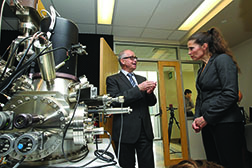
Science is my world. And as Canada’s Minister of Science, I want to be a champion for Canada’s scientists. We already have so much world-leading science taking place right here in Canada, and so many great visionaries, such as Dr. Arthur McDonald, whom I have had the pleasure of meeting, and who just won the Nobel prize in Physics. We also have world-class facilities and programs in Canada that I and my colleagues have been promoting to encourage top researchers from around the world to come to Canada to study.
I will also ensure that my colleagues have access to the Canadian scientific information they need to promote Canada when the travel abroad.
What kind of funding is the government prepared to dedicate to Canadian science and on what terms? The last government cut a lot of funding to basic research in favour of applied or commercial research. What is your view?
Well, of course we will have to wait for the Budget for specifics, but we have already committed to supporting sustainable technologies, new research chairs and strengthening support for fundamental research. We’ll also be reviewing Canada’s environmental assessment processes and examining the implications of climate change on Arctic marine ecosystems.
What about our young people? How will you champion STEM skills?
We are a government that values science and is committed to developing, attracting and retaining the brightest minds here in Canada. We strongly support science promotion and activities to inspire the next generation of leading Canadian researchers while ensuring young Canadians, especially young women, have the STEM skills required for rewarding careers in the modern Canadian economy. Furthermore, I am personally committed to working to increase the representation of women in the STEM disciplines. Improving the participation of young women and girls in science-based education, encouraging them to explore the world of science, and increasing awareness of science-based careers will enhance the diversity of talented and innovative people who will lead our future. One way I will do this is to work with the Minister of Employment, Workforce Development and Labour to help employers create more STEM co-op placements which will provide new opportunities for our youth, including young women and indigenous peoples. We are also working to promote a culture where young people and the public are engaged in and excited about science through support for programs such as the Natural Sciences and Engineering Research Council’s PromoScience.
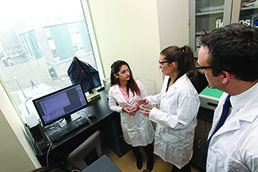
 BioLab Business Magazine Together, we reach farther into the Canadian Science community
BioLab Business Magazine Together, we reach farther into the Canadian Science community




